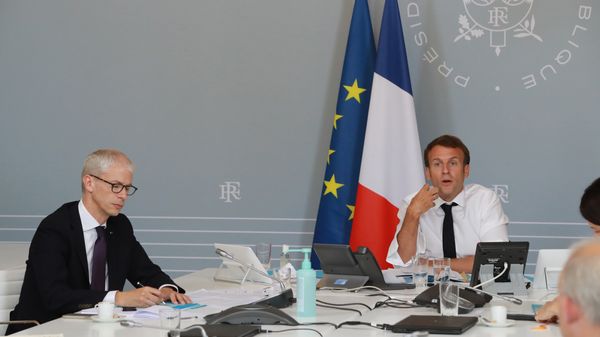Meurig Bowen appointed chief executive and artistic director of Britten Sinfonia

Currently head of artistic planning at BBC National Orchestra and Chorus of Wales, and previously director of Cheltenham Music Festival for 10 years, Bowen will join Britten Sinfonia in August 2020 to lead the orchestra’s artistic planning and administration.
He will succeed David Butcher, who will leave Britten Sinfonia at the end of July to become chief executive of the Hallé.
Bowen commented: ‘I’ve been a long-time admirer of Britten Sinfonia’s distinctive musicianship and the vitality and sheer excellence of its music-making. It’s therefore a great joy to be able to follow in David Butcher’s footsteps and to work with Britten Sinfonia’s virtuoso musicians, highly committed staff and board to help shape an invigorating future for one of the world’s finest chamber orchestras.’
Sachsen legt Sofortprogramm in Höhe von rund 6 Millionen für freiberufliche Musikpädagogen und Musikschulen auf
Sachsens Kulturministerium unterstützt die musische Bildung ab heute mit einem neuen Sofortprogramm in Höhe von rund 6 Millionen Euro. Mit dem Programm sollen die Einnahmeverluste der Musikschulen aus Unterrichtsgebühren aufgrund der Corona-Pandemie ausgeglichen werden. Zudem werden 60% der Honorarausfälle von freien oder privaten Anbietern von außerschulischem Musikunterricht ersetzt.
„Ich freue mich sehr, dass wir die Musikschulen jetzt in dieser schwierigen Zeit unterstützen können. Denn wir wissen, dass derzeit ein Drittel des Unterrichts an den Musikschulen ausfallen muss. Diese fehlenden Einnahmen wollen wir ausgleichen und so die Musikschulen bestmöglich unterstützen“ betont Kulturministerin Barbara Klepsch. Ausfallen müssen in den Musikschulen derzeit Ensemblearbeit, Gruppenunterricht und der gesamte Bereich der musikalischen Früherziehung. Entsprechend sinken die Einnahmen durch Unterrichtsgebühren um ein Drittel der geplanten Summen.
Der Sächsische Musikrat begrüßt die Finanzhilfen des Freistaates Sachsen für nicht-kommunale Musikschulen sowie für freie und private Anbieter von Musikunterricht. „Das Programm ist eine Wertschätzung gegenüber den vielen Musikpädagoginnen und Musikpädagogen in Sachsen.

Saxony sets up an immediate programme of around 6 million for freelance music teachers and music schools
Starting today, Saxony’s Ministry of Culture is supporting musical education with a new emergency programme worth around 6 million euros. The programme is intended to compensate for the loss of income of music schools from tuition fees due to the Corona pandemic. In addition, 60% of the loss of fees will be replaced by free or private providers of extracurricular music lessons.
“I am very pleased that we can now support the music schools in this difficult time. Because we know that currently one third of the lessons at the music schools have to be cancelled. We want to make up for this lack of income and thus support the music schools in the best possible way”, emphasises Minister of Culture Barbara Klepsch. At present, ensemble work, group lessons and the entire area of early musical education have to be cancelled. Correspondingly, the income from tuition fees will fall by a third of the planned sums.
Culture en France : du soulagement et beaucoup de questions après les annonces d’Emmanuel Macron
Très attendues, les annonces faites par Emmanuel Macron pour soutenir la culture ont soulagé les professionnels du secteur, notamment sur la question des intermittents, mais de nombreuses inquiétudes demeurent pour l’après-crise. Après s’être entretenu avec 12 artistes provenant de différents champs de la création, le Président a présenté différentes mesures pour venir en aide au secteur de la culture, l’un des plus touchés par les conséquences de l’épidémie de coronavirus.
Soulagement pour les intermittents du spectacle qui se plaignaient d’être jusqu’à présent les oubliés des mesures de soutien économique. Pour Philippe Gautier, secrétaire général du Snam-CGT qui représente les artistes musiciens, la mise en place d’une “année blanche” pour les intermittents est évidemment une bonne nouvelle. Mais il s’interroge sur la date de prolongation : fin août 2021. “Cela implique que les activités puissent reprendre en septembre 2020, ce dont on peut douter”.

Culture in France: relief and many questions after Emmanuel Macron’s announcements
Much anticipated, the announcements made by Emmanuel Macron to support culture have relieved professionals in the sector, particularly on the issue of intermittent workers, but many concerns remain for the post-crisis period. After meeting with 12 artists from different creative fields, the President presented various measures to help the cultural sector, one of the sectors most affected by the consequences of the coronavirus epidemic.
Relief for the intermittent workers in the entertainment industry who complained that they had so far been forgotten about the economic support measures. For Philippe Gautier, general secretary of the Snam-CGT, which represents musical artists, the introduction of a “white year” for casual entertainment workers is obviously good news. But he wonders about the extension date: end of August 2021. “This implies that activities could resume in September 2020, which is doubtful”.
Metropolitan Opera, Facing Sharp Losses, Furloughs Dozens

With the company’s September opening in jeopardy, it will put 41 staff members on indefinite furlough and cut 11 others to part-time hours.
The Metropolitan Opera’s nightly streams of archival performances have attracted robust audiences since the company closed its doors in March because of the coronavirus pandemic. The Met has 15,000 new paid subscribers to its on-demand video service.
And its four-hour At-Home Gala on April 25 was a technically impeccable, warmly received endeavor by the struggling company, which has already lost around $60 million because of the virus and stopped paying its orchestra, chorus and stagehands at the end of March.
Yet despite some positive news — emergency fund-raising in the tens of millions; 10,000 new donors; its sizable virtual audience — its financial outlook remains grim. The prospect of large gatherings in New York is still far off and the planned opening of the Met’s season in September is in serious question. On Tuesday, the company — the nation’s largest performing arts organization, with a $308 million annual budget — said it would furlough 41 members of its administrative staff, a step it had previously said would not be necessary.
 BACK
BACK